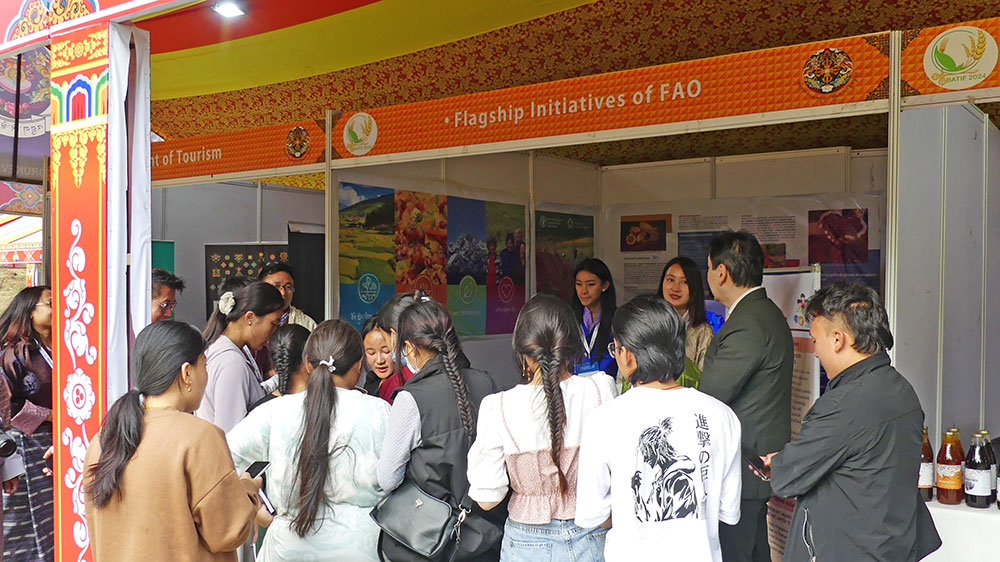
The World Food Forum (WFF), facilitated by the Food and Agriculture Organization of the United Nations (FAO) Bhutan, is launching the country chapter in June to empower young people to be more engaged in policy making, food education and to encourage startups in the agri-food sector.
A total of 20 youths registered to participate in the national chapter at Bhutan Agri-Trade and Investment Forum, which was held between May 15 and 19. The national chapter will be led by four national coordinators and will be rolled out across the country over time.
Established in 2021, the WFF is an independent, youth-led global network of partners under the FAO.
Chapter leader, Tenzin, said that WFF national chapter would engage youth at the local level, it will also contribute towards a larger and collective network that fosters partnerships in the agri-food system.
“For a climate friendly agro-ecosystem, there is a need to shift towards circularity, smart technology and efficient resource use,” she said.
To achieve the national youth chapter objectives, she said, a novel approach was a must with the platform being an open-source knowledge hub for everyone.
Another chapter leader, Sonam Lhamo, said that she got to engage and contribute in WFF Asia pacific conferences sharing and supporting projects that aim to raise awareness and drive positive change in our food systems.
“Being a youth representative for Bhutan at WFF 2023 gave an opportunity to be among diverse experts and learn. Having a forum for youth will enable everyone to learn and improve the national policies,” Sonam Lhamo said.
According to Nawang Gyeltshen, a chapter leader for Bhutan, young people have the ability to make a difference. “I want to promote the practice of sustainable agriculture, increase collaborations and innovative community of youth.”
“The team needs to create awareness about global discussions on agrifood system and as well as put Bhutanese practices and global discourses,” Nawang Gyeltshen said.
FAO representative for Bhutan and Nepal, Ken Shimizu, said that climate change-induced water shortages, farm labour shortages, wildlife predation, pests and disease outbreaks have challenged the agriculture sector in Bhutan.
“Bhutan’s poverty rate, which decreased from 23 percent in 2007 to 8.2 in 2017, increased to 12.4 percent in 2022 during the Covid-19 pandemic. The population’s overall nutritional status has improved. However, there is a ‘triple burden of malnutrition’ with undernutrition, overnutrition and micronutrient deficiencies,” Ken Shimizu said. “These are related to a lack of knowledge and access to nutritious and diversified foods.”
WFF Bhutan chapters, he said, would enable youth to actively take part in national discourses, strengthening youth’s role in decision making and providing innovative solutions towards the national objectives.
As per Ken Shimizu, FAO would guide and encourage WFF national chapters in establishing start-ups in agrifood sector, policy engagement and food promotion among others.
Need
The platform acts as a global think tank that fosters youth-led solutions in innovation, science and technology. It features a range of interactive events, networks and content platforms organised around four thematic programmes: youth action, innovation, education and culture.
The Department of Agriculture, FAO Bhutan, World Food Programme, Ministry of Education and Health Ministry are key agencies for the way forward. Collaboratively, production, nutrition, environment and better life can be achieved.
The agriculture, livestock and forestry sector saw a negative growth rate of 1.5 percent in 2022 compared to 4 percent in 2020 and to 1.42 percent in 2021, attributable mainly to decrease in crop production. Its contribution to GDP also decreased from 15.79 percent in 2021 to 14.67 percent in 2022.
Involving the governments and relevant agencies, the WFF strives to bring a profound and systematic transformation of agrifood systems that includes food supply, consumer behaviour, and improved environment.
This year, the WFF theme is “Good food for all, for today and tomorrow”, which is aimed at meeting the pressure of increasing population and requirement of food-sufficiency .
Globally, in 2022, 738.9 million people faced the hunger issue. Currently, the world is off track to meet the Sustainable Development Goal 2, Zero Hunger; which is supposed to be brought down by 2030—in contrast, over 590 million people in the next six years will suffer from hunger.
The initiative is spearheaded by principles of 2021 UN Food System Summit, the 2030 agenda for SDGs and strategic framework of FAO.












